- Home
- Joan Kilby
Meant to Be Hers Page 2
Meant to Be Hers Read online
Page 2
“No. I invited them, of course, but they couldn’t make it.” Carly paused, having gathered from Irene that this was a delicate subject. “Have you seen your mom lately?”
He drained his glass and reached for the bottle. “Not in twelve years.”
Carly sipped her scotch, grateful for the numbing haze as questions tumbled around in her head. How could he have stayed estranged from his mother for so long? What had he been doing all these years? Why had he stood her up?
She settled for the more immediate question. “How did you hear about Irene?”
Finn took off his jacket and slung it over the back of a chair. “I Skyped with her last week. She told me about her hiking expedition to Mount Baker.”
Carly passed a hand over her eyes. “I still can’t believe she went by herself.”
“She was very fit, why shouldn’t she?” Finn said. “But I asked her to email me when she got back so I would know she’d gotten home safely. When I didn’t hear from her, and she didn’t respond to my phone calls, I asked Dingo to check on her.”
“Dingo? Is he your Aussie friend from high school?”
“Yeah, the ne’er-do-well who introduced me to rock music.” Finn’s grin flashed and then he sobered. “He told me Irene’s death had been reported in the local news that night. She was found on the trail by another hiker.”
Until this moment Carly had avoided forming a mental image of Irene at the scene of her death. Now she staggered to her feet and across the tiled floor to lean over the sink, her stomach contracting convulsively. It was wrong that her aunt should have died alone, possibly in pain, without anyone to even hold her hand. Wrong, wrong, wrong.
Finn was instantly at her side. “I had no idea you were such a lightweight drinker, Maxwell. Do I need to take you to the bathroom and hold your hair?” He spoke lightly but his hand on her back was steady and comforting.
“No.” She swallowed, willing the wave of nausea to subside. Then she splashed cold water over her face. Finn handed her a towel to dry herself. When she’d recovered, she said, “Irene asked me to go on an Alaskan cruise with her this month. If I’d said yes she might still be alive. She and I could be watching humpback whales together right now. If something went wrong I would have been with her.”
Finn took her by the shoulders, forcing her to focus on him. “You couldn’t have known she was going to have a brain aneurysm. Her death wasn’t your fault.”
Maybe not. But she wished she’d made time for her aunt instead of chasing that Wallis Group account. An account she still desperately wanted. Carly dragged her sleeve across her damp eyes. “Did she know anything was wrong with her health? She didn’t say anything to me.”
“Nor to me.” He rubbed Carly’s arm. “Don’t beat yourself up. She had lots of friends. She could have asked someone else to go on the cruise. Or to go hiking with her. Even then there’s no guarantee she would have survived.”
“I know.” Carly filled her glass with water from the tap. Through the window she could see the backyard and the new leaves on the trees. A pile of tomato stakes rested against the fence next to the shed. April was the month Irene started to dig the garden beds for planting vegetables. Carly could picture her getting tools from the garden shed in the corner of the yard. Trundling wheelbarrow loads of compost over to the beds. Instead, the garden was overgrown with weeds and the grass needed cutting.
“Carly?” Finn said. “Are you okay?”
“I haven’t eaten much today.” She pressed a hand to her stomach. “The scotch is hitting me hard.”
“I meant, in general.” He paused, his gaze searching. “I got the impression Irene was worried about you. If there’s anything I can do, let me know.”
Carly closed her eyes at the rough caring in his voice. She’d had a massive crush on him for years when she was a teenager, but though he’d been friendly and teasing, he hadn’t seemed to notice her in “that way” until the summer after he’d graduated high school.
He’d invited her to the year-end concert put on by Irene’s students and to the party afterward. That night he was to perform part of the repertoire he was using for his live audition for the Juilliard School of Music the following week. She’d bought a new dress and sat in the first row next to Irene, her palms damp and heart racing, not sure if she was more excited about his first major public performance, or what might happen afterward.
The concert was held in the high school auditorium and was open to the public. All his schoolteachers and classmates, his friends and their parents, and all of Irene’s other students’ families had been in the audience. Everyone knew of his talent and was rooting for him to be awarded a scholarship to the prestigious music school. The anticipation had been building for weeks and was a fever pitch by the night of the concert.
And then, disaster. Finn’s performance was a shambles. His fingers stumbled over the keys, he forgot whole passages, he stopped midbar and skipped notes. It was so unlike him. Then someone in the back booed and Finn stalked offstage without finishing. Irene had been gray-faced, speechless. His parents, Nora and Ron, had hurried out, their heads hanging. Every single person in the audience had felt some combination of shock, betrayal and disappointment. What should have been a jubilant celebration had turned into a debacle. Finn hadn’t gone to New York for his Juilliard audition, nor did he pursue what should have been a stunning classical career. A week after the concert he left town, never to return. He’d not only stood Carly up for the party, he hadn’t contacted her or answered her calls. She’d never seen him again until today.
“Why was Aunt Irene worried about me?” Carly asked. One more thing she would never be able to ask her aunt. It was hard to comprehend the fact that she was gone. That Carly could never again pick up the phone and hear her voice.
“Just that you were working too much,” Finn said. “I could have misinterpreted. Aren’t you a high school guidance counselor?”
“That was years ago,” she said. “I switched to human resources. Recently I got a job with an international head hunting firm.” She had loved counseling teenagers but one day she’d looked around and realized that her friends were leap-frogging to the top in their various professions whereas she was stagnating. Now or never, she’d told herself, and started applying for jobs that would make use of her dual major in business and psychology. She’d worked her way up the ladder and had recently landed a plum position at a prestigious company.
“Sounds like a big change,” Finn said. “Do you like it?”
“Love it.” Mostly. Irene was right about working hard. Most weeks she logged upwards of sixty hours. Kind of put a cramp in anything else she might want to do, like have a life. But the payoff would be worth it when one day she got that corner office and the word partner after her name.
“Irene told me you live in Los Angeles,” she said, changing the subject. “What do you do there?”
“Drink too much,” he said cheerfully and raised his glass.
“She had such high hopes for you.” The words fell out of her mouth and hung in the air between them.
“My life isn’t over yet.” Their eyes met and his smile faded at the reminder that Irene’s was.
Cursing her lack of tact, she touched his arm. “Sorry.” She couldn’t begin to understand what had been going through his head at that concert or why he’d blown off a chance for a place at Juilliard. Such a waste of talent.
Finn poured himself another shot. Seeing his long, tapering fingers on the bottle—a pianist’s hands—brought back the memory of their first, and only, kiss. The stuffy heat in the third-floor turret of this house, his hands anchoring her hips, the slide of his tongue against hers. Remembering, a pooling warmth settled in her belly that had nothing to do with the scotch.
He raised the bottle. “Hit you again?”
She pushed her glass closer. He held her wrist to keep the glass
steady and sloshed in another two fingers’ worth. Then he clinked glasses. “Here’s to you, Carly Maxwell. Long time, no see.”
This time when she looked into his eyes, a rush of boozy affection washed over her. With his black hair brushed back from a high tanned forehead and his rakish grin, he looked like a pirate in a designer suit. “To the good old days.”
He smiled and gave her a wink that made her heart skip. “What might have been may still be yet.”
Peter, Irene’s attorney, entered the kitchen looking for someplace to put his empty coffee cup. He set it next to the sink. “Carly, while I’m thinking of it, come see me at my office next week for the reading of Irene’s will. I’m her executor.”
Carly had been so busy organizing the funeral and calling people that she hadn’t had time to think about what was going to happen with Irene’s property and personal effects. She hoped Irene had remembered how much she loved the seascape that hung in the dining room. It reminded her of their beachcombing expeditions. “I’ll call first thing Monday to make an appointment.”
Peter spied the bottle of scotch. “Is that alcohol? I sure could use a drink.”
“What’ll you have?” Finn went to the cupboard over the fridge and started pulling down liquor bottles. “There’s also bourbon, gin, vodka and brandy.” He handed the bottles to Peter, who lined them up on the table. “Carly, are you okay with dipping into Irene’s stock of liquor?”
“Of course,” Carly said. “She liked her guests to enjoy themselves.”
“To Irene.” Finn raised his glass. “An awesome teacher and a good friend.”
“To Irene,” Carly and Peter chorused.
“Now,” Finn said. “It’s time to pay tribute to the lady.” He headed back to the living room. Carly heard him announce, “Booze in the kitchen, folks. Help yourselves. Then come and sing.”
People began to stream into the kitchen. Carly helped them find glasses and ice then left them to it. She wandered back to the living room and stood against the wall between the fireplace and the bay window. Outside, the sun was setting spectacularly over Bellingham Bay.
Finn organized Irene’s music students, past and present, coaxing a red-haired man to pick up a guitar from the stand in the corner of the dining room. A fortysomething woman in sleek black pants and a pullover took the cello from the same stand. A teenage boy produced a tenor saxophone and a twentysomething woman a clarinet. The rest Finn arranged into a choir circling the piano where so many of them had honed their singing skills.
He sifted through bundles of sheet music and selected a piece. Then he sat on the bench seat. The instrument was a full concert grand in a richly gleaming mahogany. He ran his long fingers softly over the ivories. Around the room, heads turned and conversation hushed. Carly held her breath, hoping he wouldn’t play anything sad that would make her cry.
With a ripple of notes and a flourish of his hands, Finn launched into a popular Gershwin show tune, one of Irene’s favorites. Startled, her aunt’s former students glanced at each other, then smiled. One woman began to sing, then another. One by one, the other instruments joined in and soon the pickup orchestra and choir were in full swing.
Carly kicked off her high heels and took off her suit jacket, relaxing for the first time in days. The other guests drew closer, their gloomy expressions turning to smiles. Others hurried back out from the kitchen with drinks in their hands. Before long, the whole room was rocking, just as it used to when Irene threw a party. When the first song was over, Finn quickly got them started on another, pounding out the notes, embellishing with his own improvisations. Voices lifted in a rousing tribute to the woman they’d all loved. Music had been Irene’s life and Carly was grateful to Finn for transforming the tragic occasion into one of celebration.
Bottles collected on the coffee table. Booze was poured directly into teacups.
Carly drifted back to the kitchen. There the non-singers had gathered to drink shots and exchange anecdotes about their absent friend. The somber mood had evaporated and laughter outweighed the tears. Carly learned tidbits about her aunt that she’d never known as a youngster only coming for summer visits. About how Irene had been a breath of fresh air in the stuffy garden club, how she’d baked dozens of loaves of her special sourdough bread at Christmas for the homeless, how she’d done the limbo at the animal shelter fund-raising party.
“Remember when she got Rufus?” Frankie, the next-door neighbor, had spiky black hair and an impish grin. “He was from a pet hoarder’s home and was skinny and mangy. He had so many issues no one wanted him. But she took him and worked with him and now he’s a beautiful dog.”
Rufus. Carly squinted at her watch. Nearly 7:00 p.m. and the dog hadn’t had any dinner. She got to her feet, grabbed for the back of the chair and ended up clutching Frankie’s shoulder. Whoa. Getting a bit tipsy. The room swayed as she crossed to the laundry room where her aunt kept a big plastic bin of kibble. Carly scraped the bottom with the plastic scoop and got only half a cup. That didn’t seem like enough. She added a couple of egg salad sandwiches from the platter on the counter and carried his bowl outside.
Dusk was falling. The sky glowed with the last light of day but the long backyard was full of shadows and the cedar trees along the back fence were a blur of black.
“Dinner, Rufus. Here, boy.” She set his bowl onto the concrete patio.
The dog didn’t come bounding up as she’d expected. Maybe he was patrolling the back fence, saying hello to the neighboring spaniel. Or digging in the soft dirt beneath the cedars. He was probably fine but she should check. Now where had she put her shoes? Her stockings were already ruined but even so, she didn’t fancy crossing the darkened lawn in what amounted to bare feet.
“Carly?” Beneath the patio light, Brenda’s cheeks were rosy and her blond hair ruffled. “D’you know if Irene has more mixer anywhere? I couldn’t see any in the pantry.”
“I’ll have a look.” Carly took one last quick scan of the yard, saw no sign of Rufus, and went inside.
She found more tonic water and cola. Then the opening bars of “Happy Talk” from the musical South Pacific drew her back to the living room where the singers stood four and five deep around the piano. At the town’s summer solstice party every year Irene led the Fairhaven choir in this upbeat song. Carly had no musical talent herself but she knew all the words to all the tunes in her aunt’s record collection. She belted out the song, secure in the knowledge that her flat notes would be drowned out by the well-trained voices.
Finn caught her eye and a moment of wordless joy passed between them. Maybe alcohol was making her brain fuzzy but it was wonderful to see him again. For years she’d put him to the back of her mind, never quite forgiving him for that summer. Whatever friction remained between them, he was probably the only other person in the world who had known her aunt as well as she did—and would miss her as much. Tears welling in her eyes, she smiled as she sang.
CHAPTER TWO
“THAT’S THE WAY, one foot in front of the other.” Finn put his arm around Carly’s waist to guide her up the staircase, no easy task given she wasn’t in full control of her limbs. He pretended he didn’t notice her left breast moving against his rib cage.
Outside a taxi sounded its horn, ready to take another group of guests home or to their hotel. When Finn had realized the party was getting out of hand he’d insisted drivers hand over their car keys. Brenda had purred at him as she put her keys in the bowl, evidently under the mistaken impression she was participating in a seventies-style, sexy free-for-all. He hadn’t seen her for a while and assumed she’d found a bedroom upstairs and was sleeping it off.
As he paused at the landing, Carly slithered out of his grasp and sat abruptly. She gazed blearily up at him, her blond hair mussed and her sky-blue eyes smudged with mascara. The top three buttons of her tailored white blouse were undone, exposing the curve of a creamy bre
ast.
“Ya know,” she said, slurring her words and stabbing a finger at him. “Ya might be a screwup but you’re awesome. You turned a stuffy funeral into a f-fiesta. Irene woulda been proud.”
“She deserved a good send-off.” A screwup? Was that how Carly thought of him? True, he’d passed up a chance at a music scholarship after working his ass off for years. But at eighteen he’d changed his mind about wanting to be a classical pianist so it was no loss.
“How come you’re not drunk?” Hiccupping, Carly lolled against his leg, stroking the fabric of his suit.
“Didn’t feel like it.” He’d restrained himself when he realized Carly was going on a bender. Partly because he owed it to Irene to watch out for her. But also because his own emotions—grief over Irene’s death, his feelings for Carly, plus ambivalence about being back in Fairhaven—were too big and complicated to drown and too scary to unleash.
Tonight Carly had been like a tightly coiled spring with the pressure released, springing in every direction, out of control. Something was up with her, as Irene had alluded to in their last conversation. He’d like to know more, but he wasn’t going to get a meaningful answer in her present condition.
He grabbed her under her arms and tugged her gently to a standing position. “Ready to go?”
She swayed into him, draping her arms around his neck and plastering herself against his body, meltingly soft and warm. “Man, I am so ready.”
Her breath held a not unpleasant aroma of aged scotch and her hair gave off a perfumed scent he wanted to bury his nose in. His hands slid of their own accord down her back and settled on the flare of her hips. His gaze dropped to her full, pink mouth. Did she taste as good as he remembered from that time in the tower?
A few years ago he’d looked her up on social media, but she didn’t share anything publicly except a few photos of herself with work colleagues, and cute animal videos. His finger had hovered over the Add Friend button then he’d decided that even if she wasn’t still pissed off at him, he couldn’t bear to field questions about “what are you doing these days?” Followed by polite silences when she found out. Although he didn’t know why he thought that way. Everyone he knew in Los Angeles thought he was doing pretty darn good. And he was, only not in the way folks in Fairhaven had expected.

 Say I Do
Say I Do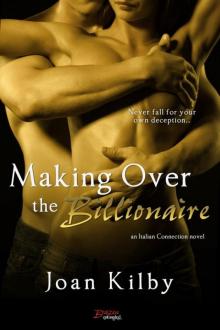 Making Over the Billionaire (Italian Connection)
Making Over the Billionaire (Italian Connection) Two Against the Odds
Two Against the Odds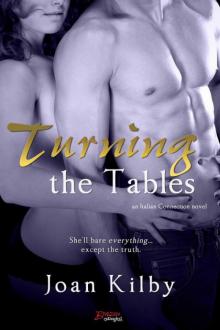 Turning the Tables
Turning the Tables The Secret Son
The Secret Son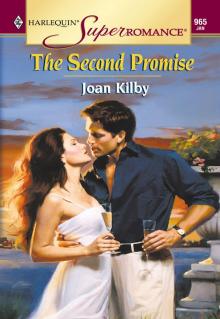 The Second Promise
The Second Promise Her Great Expectations
Her Great Expectations Child of Their Vows (Harlequin Super Romance)
Child of Their Vows (Harlequin Super Romance) Meant to Be Hers
Meant to Be Hers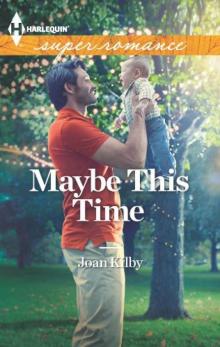 Maybe This Time
Maybe This Time Mad About You
Mad About You The Bull Rider’s Return
The Bull Rider’s Return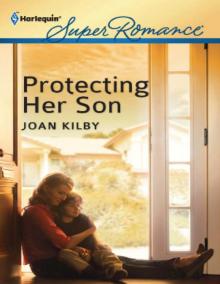 Protecting Her Son
Protecting Her Son Home to Hope Mountain (Harlequin Superromance)
Home to Hope Mountain (Harlequin Superromance)